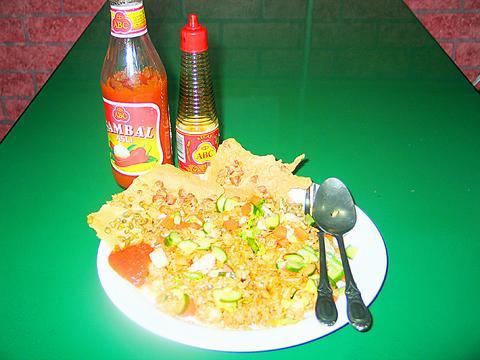Considering the popularity of Southeast Asian foods and the number of Indonesian workers in Taiwan one might expect to see a lot of Indonesian restaurants. In fact there are just a handful and few of these offer authentic Indonesian cuisine. Dede's mini-mart and restaurant fills the void with a small, but tasty selection of Indonesian fare.
An Indonesian-born Chinese, Dede moved to Taiwan four years ago to study Chinese. After having parcels of his favorite snack foods sent from home, he decided to open his own import shop on the second floor of Taipei Railway Station that would cater to the Indonesian community living in Taipei.
After a successful year he seized the opportunity to open a second mini-mart a few doors down from the Taipei Grand Mosque, catering to Taipei's wider Muslim community. This time he included a few tables and a short menu of strict Halal dishes (using only meat butchered by a Muslim).

PHOTO, DIANA FREUNDL, TAIPEI TIMES
The menu, like the surroundings, is simple, with only 11 items to choose from, but the spices used are imported and the cooking is all done by an Indonesian chef. The food can be made spicy or mild depending on individual taste, and if it's not quite spicy enough, there are bottles of sambal hot sauce on every table.
The nasi rendang sapi (beef coconut with rice) and nasi kari ayam (chicken curry with rice) are the most recommended and popular choices among regulars. The remaining options include a few seafood choices and mie (noodle) dishes. There is no vegetarian alternative listed on the menu, but the cook will prepare a enjoyable hot and spicy nasi goring sayur (vegetable fried rice) on request.
Beverages can be brought inside or purchased from the limited selection of tetra-pack juices in the cooler. In addition to all the imported Indonesian nonperishable goods and toiletries there is also an assortment of sweet and savory snack foods available at the front of the shop. The rempeyek (deep fried peanut and bean crackers) and krupuk (shrimp crackers) are great for scooping up your food or for snacking on afterward.
Indojaya Cafe and Mini-market is a no-frills environment and the food is simple, but it's clean, cheap, spicy and tastes great. There's also a KTV in the basement with possibly the largest selection of Indonesian pop songs in Taiwan.

On April 26, The Lancet published a letter from two doctors at Taichung-based China Medical University Hospital (CMUH) warning that “Taiwan’s Health Care System is on the Brink of Collapse.” The authors said that “Years of policy inaction and mismanagement of resources have led to the National Health Insurance system operating under unsustainable conditions.” The pushback was immediate. Errors in the paper were quickly identified and publicized, to discredit the authors (the hospital apologized). CNA reported that CMUH said the letter described Taiwan in 2021 as having 62 nurses per 10,000 people, when the correct number was 78 nurses per 10,000

As we live longer, our risk of cognitive impairment is increasing. How can we delay the onset of symptoms? Do we have to give up every indulgence or can small changes make a difference? We asked neurologists for tips on how to keep our brains healthy for life. TAKE CARE OF YOUR HEALTH “All of the sensible things that apply to bodily health apply to brain health,” says Suzanne O’Sullivan, a consultant in neurology at the National Hospital for Neurology and Neurosurgery in London, and the author of The Age of Diagnosis. “When you’re 20, you can get away with absolute

May 5 to May 11 What started out as friction between Taiwanese students at Taichung First High School and a Japanese head cook escalated dramatically over the first two weeks of May 1927. It began on April 30 when the cook’s wife knew that lotus starch used in that night’s dinner had rat feces in it, but failed to inform staff until the meal was already prepared. The students believed that her silence was intentional, and filed a complaint. The school’s Japanese administrators sided with the cook’s family, dismissing the students as troublemakers and clamping down on their freedoms — with

As Donald Trump’s executive order in March led to the shuttering of Voice of America (VOA) — the global broadcaster whose roots date back to the fight against Nazi propaganda — he quickly attracted support from figures not used to aligning themselves with any US administration. Trump had ordered the US Agency for Global Media, the federal agency that funds VOA and other groups promoting independent journalism overseas, to be “eliminated to the maximum extent consistent with applicable law.” The decision suddenly halted programming in 49 languages to more than 425 million people. In Moscow, Margarita Simonyan, the hardline editor-in-chief of the